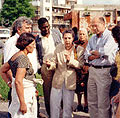| |
 |
 |
|
 |
 |
 |
 |
 |
|
 |
| Urban governance and participation |
 |
| One of the areas chosen by SHS for the study of social transformations is urban development. UNESCO’s Social and Human Sciences Section (SHS) concentrates particularly on urban policies through interdisciplinary networks of comparative, international research. This approach focuses on the in-depth analyses of urban development processes. |
 |
There has been urban planning in industrialized countries for over fifty years, but almost nowhere has this met with unqualified success. To give just one example, large sectors
of the world’s cities are built with neither technical nor professional help and without any public regulations. The proportion of these haphazard but permanent cities in developing countries is often as much as 60% of the built-up area. Urban studies in the Western world have until now clearly been looking at the generation rather than redistribution of wealth and public services; at functional specialization rather than a general mix; at segregation rather than cohesion; and, finally, at power-wielding agents rather than residents’ participation. With globalization of the economy imposing other ways of doing business, urban management has had to cope with decentralization, the emergence of new actors and new partnerships as well as redefining the role of the State in the regulation of available space.
Urban policy / Urban governance
In this context, there are two major challenges guiding SHS’ action: developing knowledge capable of contributing to the formulation and implementation of new urban policies, with the emphasis on democratic governance as the basis, and capacity-building for residents, technicians and decision-makers in the urban domain:
Cities, the environment and social relations between men and women
This project started in 1997 and ended in 2005. It was coordinated by the Swiss MOST (Management of Social Transformations Programme) Liaison Committee, with the support of the Swiss Development and Cooperation Directorate, and was monitored by UNESCO’s MOST Programme. The project comprised a comparative research-action network of city suburbs in eight countries: Burkina Faso and Senegal in Africa; Argentina, Brazil, Cuba and the Dominican Republic in Latin America and the Caribbean; and Bulgaria and Romania in Eastern Europe.
The two operational thrusts of the study aimed to help build housing where men and women have equal say in decision-making:- influencing the development of long-term public policy in the urban environment and integration of a “gender” perspective;
- creating and consolidating a network of researcher-actor expertise.
Urban research programme for development
The first phase of this project, initiated by France’s Priority Solidarity Fund (Fonds de solidarité prioritaire), was carried out between 2001 and 2004. Coordinated by GEMDEV (Association for developing scientific interests in the study of globalization and development), the project’s action focuses on new ways of working for urban development in all the ‘priority solidarity’ countries as defined by France’s cooperation programme: sub-Saharan Africa, South-East Asia, countries around the Mediterranean basin and the Caribbean.
The main lines that stand out from the findings of the first three years are participatory urban management and the political dimension of urban development which introduces the issue of the scale of connections between what is local and what is international.
Districts of the world
The project ‘Quartiers du monde’ (Districts of the world) centres on citizen participation: young people of differing social classes building participatory urban governance.
Eighteen city districts in eight countries actively take part in the network: Bolivia, Brazil, Colombia, France, Mali, Morocco, Senegal and Spain. The project, coordinated by the ‘Quartiers du monde’ association, has among its partners ENDA (Environmental Development Action in the Third World) and other NGOs, as well as local governments and the French Government’s Inter-ministerial Directorate of Cities.
Website: 'Quartiers du monde’
Contacts: Germán Solinís and Brigitte Colin
On-going Projects
Completed Projects
Photo: Sofia, Bulgaria © G. Solinís |
 |
|
 |
 |
 Email this page Email this page  Printable version Printable version
|
 |
|
|


